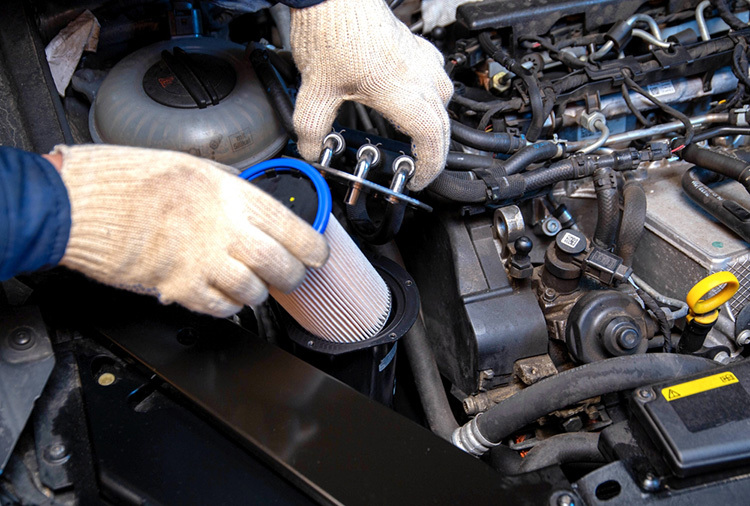If you’ve ever wondered what a fuel filter does, when to replace it, or why your Nissan might be having fuel system issues, you’re in the right place. Whether you drive a Nissan Rogue, Altima, Sentra, or Titan, understanding your fuel filter can save you money, boost performance, and prevent major repairs down the road.

If you’ve ever wondered what a fuel filter does, when to replace it, or why your Nissan might be having fuel system issues, you’re in the right place. Whether you drive a Nissan Rogue, Altima, Sentra, or Titan, understanding your fuel filter can save you money, boost performance, and prevent major repairs down the road.
What Is a Fuel Filter, and Why Does It Matter?
Think of your fuel filter as the security guard of your Nissan’s fuel system. It keeps dirt, rust, and other contaminants from reaching your engine, ensuring that only clean fuel makes it through. This leads to:
- Better fuel efficiency (saving you money at the pump)
- Smoother engine performance (no rough idling or stalling)
- Longer engine life (less wear and tear)
Without a working fuel filter, debris clogs fuel injectors, leading to misfires, poor acceleration, and reduced gas mileage.
How a Fuel Filter Works
Here’s how your Nissan fuel system operates and where the fuel filter plays a critical role:
- Fuel Tank: Stores gasoline or diesel.
- Fuel Pump: Pushes fuel toward the engine.
- Fuel Filter: Removes dirt, rust, and debris before fuel reaches the engine.
- Fuel Injectors: Spray clean fuel into the combustion chamber.
- Combustion Process: Ignites fuel, powering your Nissan.
A clogged fuel filter means dirty fuel enters the engine, leading to poor performance and costly repairs.
Signs Your Nissan’s Fuel Filter Needs to Be Replaced
A clogged fuel filter restricts fuel flow, affecting your Nissan’s performance. Here are the most common warning signs:
- Sluggish Acceleration: Pressing the gas pedal, but the car hesitates.
- Decreased Gas Mileage: Filling up more often than usual.
- Stalling or Rough Idling: Hesitation or stalling at stoplights.
- Check Engine Light: Fuel pressure issues may trigger a warning light.
- Loud Fuel Pump Noises: A struggling fuel pump may make a whining noise.
If you experience any of these symptoms, schedule a service appointment at Monroe Nissan Service Center.
How Often Should You Replace Your Nissan’s Fuel Filter?
Fuel filter replacement schedules vary by model and driving habits.
| Nissan Model | Recommended Fuel Filter Replacement |
|---|---|
| Nissan Sentra, Altima, Rogue (Older Models) | 30,000 – 40,000 miles |
| Nissan Frontier, Titan, Murano (Gas Models) | 40,000 – 50,000 miles |
| Nissan Diesel Models | 15,000 – 20,000 miles |
| Newer Nissan Models (With In-Tank Filters) | 60,000 – 80,000 miles |
Frequent short trips, stop-and-go traffic, or low-quality fuel may require earlier replacement.
If you’re unsure when your fuel filter was last replaced, visit Monroe Nissan Service Center for an inspection.
Can You Replace a Nissan Fuel Filter Yourself?
For older Nissan models with external fuel filters, DIY replacement is possible. However, modern models with in-tank filters require professional service.
DIY Fuel Filter Replacement Steps (For External Filters)
- Relieve Fuel Pressure: Disconnect the fuel pump fuse and start the engine until it stalls.
- Locate the Filter: Usually near the fuel tank or along the fuel line.
- Remove the Old Filter: Use a wrench to loosen fittings; be cautious of fuel leakage.
- Install the New Filter: Ensure correct orientation and secure fittings.
- Reconnect and Test: Start the engine and check for leaks.
For in-tank fuel filters (common in newer Nissan models), schedule a professional service at Monroe Nissan.
Fuel Filter FAQs
Does my Nissan Altima have a fuel filter?
Yes! However, newer models (post-2005) have in-tank filters, requiring professional maintenance.
What happens if I don’t replace my fuel filter?
A clogged fuel filter can lead to engine misfires, poor acceleration, decreased fuel efficiency, and even engine failure.
Can bad gas clog a fuel filter?
Yes. Low-quality or contaminated fuel increases debris buildup, causing the filter to clog faster.
Does a 2017 Nissan Rogue have a fuel filter?
Yes, but it’s a non-serviceable in-tank filter, meaning it requires professional replacement.
How much does a Nissan fuel filter replacement cost?
Costs vary by model, but expect to pay $80 – $200. Check our Nissan service specials for potential savings.
Extend the Life of Your Fuel Filter
Follow these maintenance tips to keep your Nissan running efficiently:
- Use High-Quality Fuel: Lower-quality fuel contains more contaminants, leading to faster clogging.
- Avoid Driving on Empty: A near-empty tank can pull sediment from the bottom into the filter.
- Stick to Nissan’s Maintenance Schedule: Regular fuel system inspections prevent costly repairs.
- Get a Fuel System Check-Up: If you notice performance issues, don’t ignore them—have your system inspected.
For expert maintenance, schedule a fuel system service at Monroe Nissan.
Final Thoughts: Is Your Nissan’s Fuel Filter in Good Shape?
Now that you understand everything about fuel filters, the real question is: Is yours working properly?
If you’re unsure, don’t take chances. Bring your Nissan in for a fuel system inspection at Monroe Nissan Service Center. Our certified Nissan technicians will:
- Diagnose fuel system issues
- Inspect your fuel filter for clogging
- Provide fast, reliable service to keep your Nissan running smoothly
Schedule your service today: Book an Appointment
